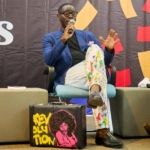
Ghana’s creative economy has been positioned as a central pillar for national development, following a call from cultural theorist and gallerist V. L. K. Djokoto at the Creative Entrepreneurs Forum 2025 in Accra.
Addressing participants at the British Council, Mr Djokoto urged policymakers and industry stakeholders to recognise the creative sector as a strategic driver of economic transformation rather than a peripheral industry.
He argued that Ghana’s long-term prosperity depends on elevating creativity and cultural production to the forefront of national planning.
Speaking on a panel examining the wider impact of the creative industries, the 30-year-old financier and head of the historic family office D. K. T. Djokoto & Co articulated a bold vision centred on youth-led innovation.
He stressed that Ghanaian creatives possess both the capacity and determination to redefine Africa’s global image, provided they receive the necessary institutional backing and policy support.
Mr Djokoto highlighted the wider societal value created by creatives, noting that cultural expression contributes to national identity, social cohesion, and the preservation of heritage.
He cautioned against measuring creative impact solely in economic terms, asserting that artists, writers, and performers often shape public consciousness in ways that defy conventional metrics.
Reflecting on the forum, he praised the collaborative spirit on display, adding that such platforms are essential for building a collective movement focused on empowering young Ghanaians.
Mr Djokoto reiterated his commitment to engaging with youth-centred initiatives and strengthening networks across the creative economy.
With a portfolio spanning cultural curation, real estate management, and rural development, as well as published works including Revolution and the play Afro Gbede, Mr Djokoto represents a new generation of cultural leaders blending financial acumen with artistic vision.
The Creative Entrepreneurs Forum brought together practitioners from across Ghana’s creative landscape to explore the industry’s evolving opportunities and challenges.
Discussions underscored a growing belief that targeted investment, structured policy frameworks, and long-term vision are required to unlock the sector’s full potential.
Closing his remarks, Mr Djokoto affirmed that Ghana stands at a strategic inflection point. Progress, he noted, will depend on bold ideas, national commitment, and trust in the creative power of the country’s youth to chart a transformative path forward.

